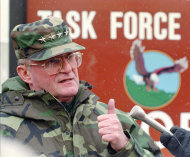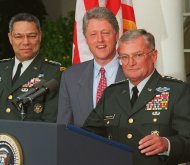 SEATTLE (AP) — Retired Army Gen. John Shalikashvili, the first foreign-born chairman of the Joint Chiefs of Staff, who counseled President Bill Clinton on the use of troops in Bosnia and other trouble spots, has died, the Army said in a statement. He was 75.
SEATTLE (AP) — Retired Army Gen. John Shalikashvili, the first foreign-born chairman of the Joint Chiefs of Staff, who counseled President Bill Clinton on the use of troops in Bosnia and other trouble spots, has died, the Army said in a statement. He was 75.Shalikashvili died Saturday morning at Madigan Army Medical Center in Washington state following complications from a stroke suffered on August 2004 that paralyzed his left side.
 President Barack Obama said Saturday that the United States lost a "genuine soldier-statesman," adding in a statement that Shalikashvili's "extraordinary life represented the promise of America and the limitless possibilities that are open to those who choose to serve it."
President Barack Obama said Saturday that the United States lost a "genuine soldier-statesman," adding in a statement that Shalikashvili's "extraordinary life represented the promise of America and the limitless possibilities that are open to those who choose to serve it."The native of Poland held the top military job at the Pentagon in the Clinton administration from 1993 to 1997, when the general retired from the Army. He spent his later years living near Joint Base Lewis-McChord, Wash., and worked as a visiting professor at Stanford University's Center for International Security and Cooperation.
"He represented America at its best," former President Clinton and his wife, U.S. Secretary of State Hillary Rodham Clinton, said in a statement Saturday. "An immigrant who entered the Army as a draftee, he rose to become an exceptional Chairman of the Joint Chiefs of Staff who oversaw more than forty operations, including the liberation of Haiti from a brutal dictatorship and NATO's first use of force outside its member countries in Bosnia."
Clinton pointed out previously that "Gen. Shali" made the recommendations that sent U.S. troops into harm's way in Haiti, Rwanda, Bosnia, the Persian Gulf and a host of other world hotspots that had proliferated since the end of the Cold War.
"He never minced words, he never postured or pulled punches, he never shied away from tough issues or tough calls, and most important, he never shied away from doing what he believed was the right thing," Clinton said.
Defense Secretary Leon Panetta said in a statement that he relied on Shalikashvili's advice and candor when he served as Clinton's chief of staff during the foreign policy crises in Haiti, the Balkans and elsewhere.
"John was an extraordinary patriot who faithfully defended this country for four decades, rising to the very pinnacle of the military profession," Panetta said. "I will remember John as always being a stalwart advocate for the brave men and women who don the uniform and stand guard over this nation."In a farewell interview with The Associated Press in 1997, Shalikashvili said American military and civilian authorities need to cooperate more when they decide to get involved in such trouble spots, because so much of what the military is asked to do involves humanitarian or peacekeeping operations.
For example, he said, the military might need assistance from the Justice Department to help set up police forces, or advice from the State Department on economic aid."We know the agencies, but who is responsible for coordinating it, bringing it all in at the right time?" he said. "Haiti, Bosnia, Rwanda, even Somalia, showed us these things go forward from the first day, and there is no coordinator."
Shalikashvili was head of the Joint Chiefs when the "Don't ask, don't tell" policy on gays in the military was adopted. He had argued that allowing homosexuals to serve openly would hurt troop morale and undermine the cohesion of combat units. Years later, though, he said that he changed his mind on the issue after meeting with gay servicemen.
"These conversations showed me just how much the military has changed, and that gays and lesbians can be accepted by their peers," Shalikashvili wrote in a January 2007 New York Times opinion piece.Earlier in his career, under the first President George Bush, Shalikashvili served as NATO's supreme allied commander and also commander in chief of all U.S. armed forces in Europe. At the end of the first Gulf War, he was in charge of the Kurdish relief operation in Iraq.
In 2004, Shalikashvili also served on a senior military advisory group to the campaign of Democratic presidential candidate John Kerry, as did another former NATO commander, Gen. Wesley Clark.
Not long before his stroke, Shalikashvili spoke at the 2004 Democratic National Convention in Boston, saying, "I do not stand here as a political figure. Rather, I am here as an old soldier and a new Democrat."
Shalikashvili was born June 27, 1936, in Warsaw, the grandson of a czarist general and the son of an army officer from Soviet Georgia. He lived through the German occupation of Poland during World War II and immigrated with his family in 1952, settling in Peoria, Ill.
He learned English from watching John Wayne movies, according to his official Pentagon biography, and he retained a distinctive Eastern European accent.
Shalikashvili, who studied engineering at Bradley University in Peoria, enrolled in the Air Force Reserve ROTC, but his eyes were not good enough to be a pilot, according to a Defense Department biography.
He became a U.S. citizen in 1958 and was drafted months later. In addition to being the first foreign-born Joint Chiefs chairman, he was the first draftee to rise to the top military job at the Pentagon, the Defense Department said.More....






 7/23/2011 10:11:00 PM
7/23/2011 10:11:00 PM
 live news
live news












0 commentaires:
Post a Comment